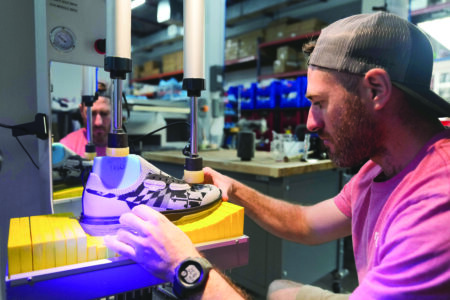Maintaining machines
Industrial maintenance skills taught at NMU camp
- Daryl Kobie, left, instructor at the recent Career Exploration Summer Camp at the Jacobetti Complex on industrial maintenance, explains the use of a bolt and gearbox. The camp took place at the Jacobetti Complex. (Journal photo by Christie Bleck)
- Louise Kobie, an assistant at the camp, shows Marek Hogan, 11, of Negaunee Township the workings behind a simple shovel. (Journal photo by Christie Bleck)

Louise Kobie, an assistant at the camp, shows Marek Hogan, 11, of Negaunee Township the workings behind a simple shovel. (Journal photo by Christie Bleck)
MARQUETTE — It’s a fact of life in the industrial world that things break. Then things have to be fixed. Then things have to be tweaked so they don’t break again.
So, it helps to know the ropes — and cables, hoists and cranes.
The types of skills required were stressed at the July 25 Career Exploration Summer Camp on industrial maintenance, which took place at Northern Michigan University’s Jacobetti Complex.
Camps were planned for a variety of subjects, such as crime scene investigation and cosmetology, in various sessions throughout the month for students in seventh through 12th grade. Students received hands-on experience exploring various careers in skilled trades and engineering.
Daryl Kobie, who teaches in NMU’s industrial technology program, was the lead instructor for the industrial maintenance camp.

Daryl Kobie, left, instructor at the recent Career Exploration Summer Camp at the Jacobetti Complex on industrial maintenance, explains the use of a bolt and gearbox. The camp took place at the Jacobetti Complex. (Journal photo by Christie Bleck)
The class started with the students learning about simple machines, and then progressed to topics such as aligning machines and gearboxes, and how electronic computer systems now are used for that alignment.
Simply put, industrial maintenance involves people getting jobs maintaining factories, which include processing plants at the mines as well as lumber and paper mills, Kobie said.
“Anything that’s manufacturing something, they have to keep the equipment up and running,” he said.
That, obviously, involves regular maintenance and repairs — and knowing how to fix machines can be a lucrative skill.
Industrial maintenance technology jobs tend to be well-paying ones, with median earnings $25 per hour, according to NMU. The projected employment growth for these jobs to 2024 is 15 percent nationally and 20 percent in Michigan.
And gender doesn’t have to be a factor in getting a job in this field, even when heavy equipment needs to be picked up.
“They have teams, so when that’s required, we can figure out ways,” Kobie said.
Objects don’t always stay stationary in the industrial maintenance world.
“Industrial maintenance techs are always picking up and moving heavy things,” he said. “Knowing the right way and the safe way to do it is very important.”
Other skills are necessary too.
“You need to be able to work with teams,” he said. “You need to be able to work with other people. That’s helpful. You’re not going to be sitting behind a desk all day.”
That means using a computer, referencing things. knowing applied technical math and energy-related science.
Kobie used a light in the students’ learning area to demonstrate how energy is a part of industrial maintenance.
“Machinery transforms energy all the time, many times,” he said. “The electricity that’s produced right there, to run that light, first it starts as coal, and coal is burned as a chemical reaction, and energy is transformed into heat, and then the heat boils water.
“So, now it’s transformed again into boiling water, which is turned into steam.”
That steam, he said, results in mechanical rotation. Then magnetic energy generates electricity, which goes into electrical transformers that supply voltage. The electrical energy burns the phosphorus gas, and the fluorescent lights give off the light.
That a lot of energy transformations.
Being proactive
Kobie acknowledged that companies used to run equipment until it broke and then fix it, maybe performing maintenance when it could.
“Now the big trend, the last 10 or 15 years, is trying to predict when a piece of machinery is going to break,” he said.
As a result, people now are knowledgeable about things like ultrasound testing, vibrations analysis and thermometer/heat analysis, he noted.
“People specialize in these things and they watch a piece of machinery,” he said.
He likened that to a person going to a doctor for a physical. In that vein, when something is discovered on a machine, action then can be taken.
This is when an industrial maintenance tech’s job can get creative and involve what Kobie called root cause analysis.
When something breaks, or something’s going to break, the tech has to make some considerations.
“Why did this piece of machinery break?” said Kobie, who stressed this question requires a follow-up. “How can we make a change, or improve it, and not let this problem happen again?”
The campers learned about simple machines, which included the pry bar, wheelbarrow and shovel, as well as parts such as the fulcrum — the point on which a lever rests or is supported, and on which it pivots. On a wheelbarrow, for instance, the fulcrum is the wheel.
The concept with these machines is simple: assuming that the amount of work going into a machine will equal the work coming out.
These machines too can be used in many larger, more complex machines in some shape or form, Kobie said.
The campers also learned about the relationship between force and distance and gadgets such as gear drives, belt drives and pulleys, having to make calculations in some instances to understand how they work.
Demonstrations helped the youngsters better comprehend how those machines can be used. For example, those pulleys were used in systems for more efficiency.
“We gain extra mechanical advantage out of the second pulley,” Kobie said.
Nick Jacobetti, 15, of Negaunee, is the grandson of the late Dominic Jacobetti, for whom the Jacobetti Complex is named and who was a long-time member of the Michigan House of Representatives.
The younger Jacobetti had little problem grasping the industrial maintenance technology concepts taught at the camp.
“I just kind of like to be creative and fix stuff,” he said.
Marek Hogan, 11, of Negaunee Township, said he went to the camp to learn more about the job his dad had: working at the Empire Mine.
“I really wanted to get the feel of what some of what it was like working at the mine and working on machinery and things like that, working with cranes and figuring out what they do at the mines and how they work on stuff, and what it would feel like to be in that situation,” Marek said.
Christie Bleck can be reached at 906-228-2500, ext. 250. Her email address is cbleck@miningjournal.net.







